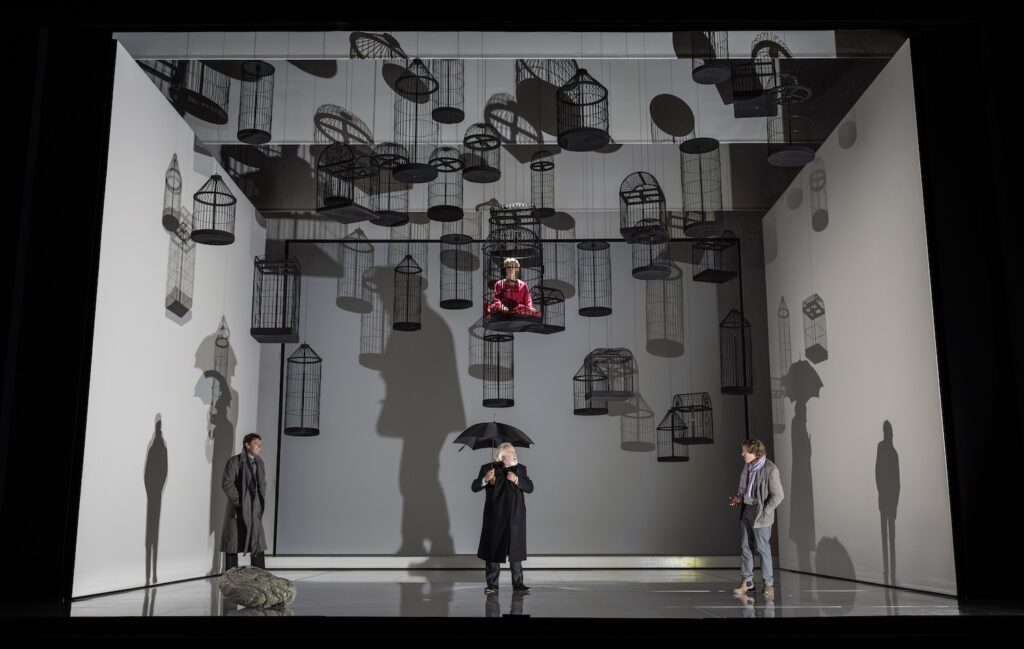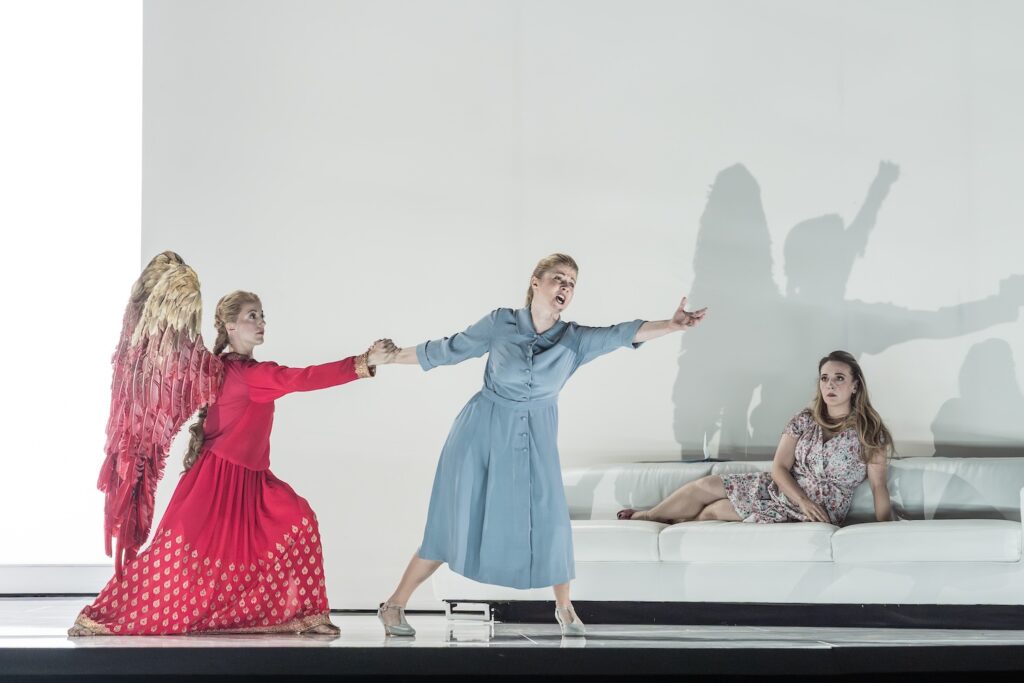A winged angel, multiple birdcages and confining walls of brilliant white dominate this symbol-heavy staging of Kátya Kabanová, a production first unveiled by Damiano Michieletto at Glyndebourne in 2021. A few minor adjustments under revival director Eleonora Gravagnola aside, the most significant difference now from those Covid-era performances is the reassuring presence of the London Philharmonic Orchestra replacing the previous chamber-sized group of instrumentalists. And what a thrill it is to hear these musicians under Robin Ticciati’s baton and to be able to enjoy the full weight of Janacek’s angst-ridden score, its churning emotions with those jagged edges set off by glorious lyricism.
But however communicative the orchestral score is, and there’s no doubt here of its surging energy and turbulence, this staging simultaneously beats you over the head with its symbols or confuses with befuddling detail. Given that it’s an opera about a woman trapped in a loveless marriage and her dreams of freedom from both a husband and a tyrannical mother-in-law, a single birdcage early on indicates the idea of confinement. No need for any head scratching to work out the implication, but the same cage is later occupied by something resembling a small boulder. Why? Is this a presentiment of a rock that will weigh her down when she jumps into the Volga? Or is it just a solid, rock-like form that represents the weight of guilt she feels for loving a man outside her marriage? Michieletto presses home the all-too visible symbols with ominous shadows (courtesy of Alessandro Carletti) which stalk Kátya and allude to her self-loathing and psychological torment. Feathers descend from the ceiling and an angel, a role beautifully taken by Miryam Tomè, haunts the stage initially to remind Kátya of her innocent childhood and affiliation with the church. Only when the vicious matriarch plucks off the angel’s wings do we feel the full impact of Kátya’s hopelessly restrictive existence.

In the souvenir programme book Michieletto comments that “Janáček has an instinct for drama” and continues with “his storytelling is so direct … it’s like a conversation in music”. If that’s the case, why the need for so much signposting? All of this is surely conveyed in the music and expressed here through some magnificent singing. It’s not as if the opera is new to regulars as it first appeared at Glyndebourne in the late 1980s when it was introduced by the German director Nikolaus Lehnhoff. Michieletto and designer Paolo Fantin offer an uncluttered minimalist concept denying any suggestion of riverside community, no church or comforting hint of village life. Except for a spacious sofa, the stage mostly reflects Kátya’s barren reality. Even the chorus in Act 3 sings offstage and where a single umbrella accompanies the storm scene. Instead, we focus on her interior life and character interaction which prompts well-defined and powerfully sung portrayals.

Not least amongst this impressive cast is Kateřina Kněžíková (lead photo) as the God-fearing Kátya – who reprises the role from 2021. From the off she creates a vivid portrayal of a tragic figure, irrevocably imprisoned by guilt and shame. She sails with ease over the orchestra in expansive moments such as her passionate confession of infidelity to the villagers and is at her most poignant when reflecting on her childhood, singing with silken tone allowing high notes to float effortlessly like the feathers that later descend when she surrenders to her would-be-suitor Boris taken by an ardent and clarion-voiced Nicky Spence. Jaroslav Březina (like Kněžíková, a native Czech) as Kátya’s husband Tichon is a similarly weak-minded individual. He cowers under the chilling Kabanicha in which Suann Bickley excels, though this mother-in-law from hell reveals false respectability and is not entirely immune to the charms of Boris’s drink-sodden uncle Dikój, a role characterfully filled by John Tomlinson.
Elsewhere, Rachael Wilson sparkles as the carefree and impulsive Varvara, bringing a welcome playfulness to her exchanges with Sam Furness’s blithe, though not fully fleshed out Kudrjas. In the pit Robin Ticciati brings out all the febrile drama of the score, the LPO players relishing the score’s jagged edges and cinematic qualities. Notwithstanding niggles about its direction and non-naturalistic aspects, the musical qualities are superb with copper-bottomed performances above and below the stage.
David Truslove
Kátya Kabanová
Music: Leoš Janáček
Libretto: Leoš Janáček based on Vincenc Červinka’s translation of The Storm, a play by Alexander Ostrovsky
Kabanicha – Suann Bickley; Tichon – Jaroslav Březina; Kátya – Kateřina Kněžíková;
Varvara – Rachael Wilson; Dikój – John Tomlinson; Boris – Nicky Spence; Kudrjas – Sam Furness; Kuligin – Charles Cunliffe; Glaša – Sarah Pring; Feklusa – Rachel Roper; Angel Miryam Tomè.
Director – Damiano Michieletto; Revival Director – Eleonora Gravagnola;
Design – Paolo Fantin; Costumes – Carla Teti; Lighting – Alessadnro Carletti; London Philharmonic Orchestra; Conductor – Robin Ticciati.
Glyndebourne Festival Opera, Lewes, East Sussex, 4 August 2025
Performances until 23 August